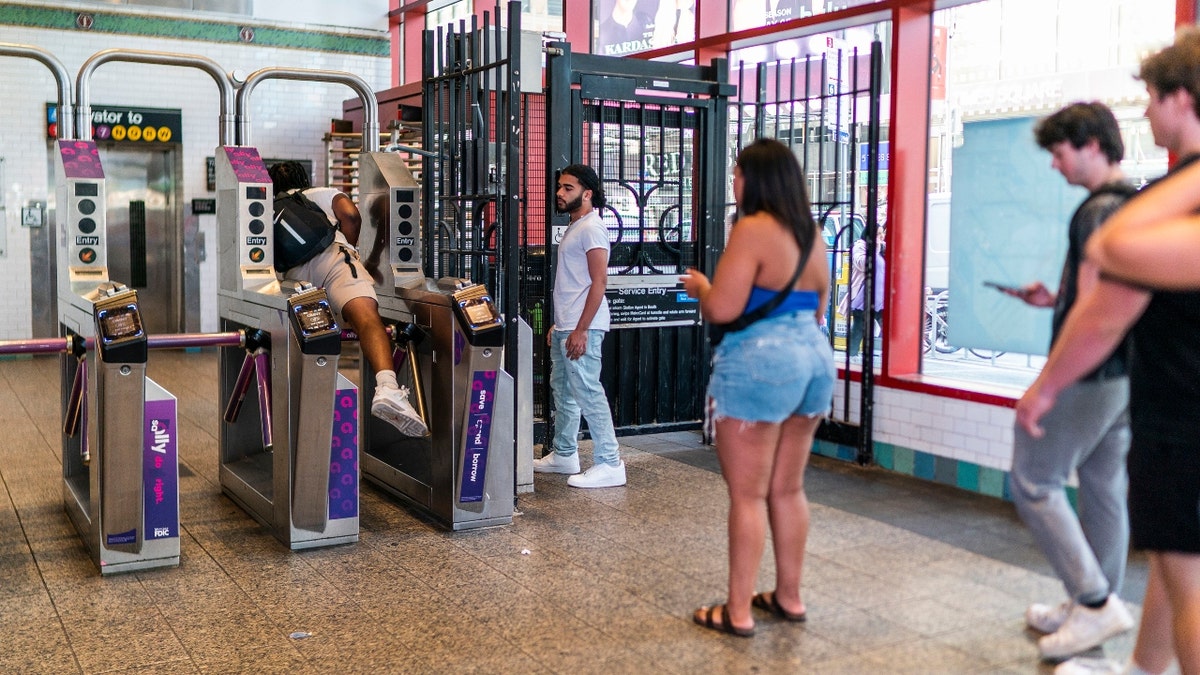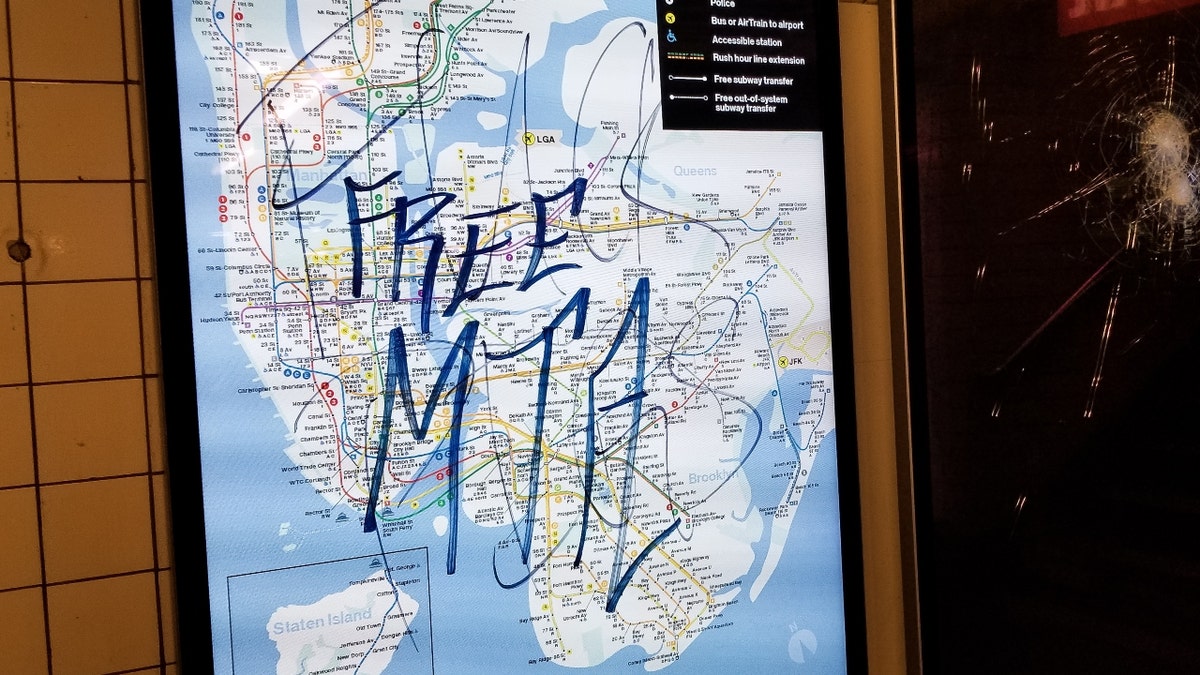Surveillance cameras are a ‘vital tool’ for police to combat crime: Sean ‘Sticks’ Larkin
Fox Nation’s ‘CrimeCam 24/7’ host Sean ‘Sticks’ Larkin discusses the significance of surveillance cameras and security footage for law enforcement.
Artificial intelligence (AI) surveillance technology can be used by governments and private businesses to deter crime, but it comes at a cost, according to experts.
The Metropolitan Transportation Authority in New York City, for example, recently confirmed that the city has deployed AI surveillance tools in seven subway stations in an effort to track how much money the city is losing to fare evasion rather than to track down people who jump turnstiles.
"The MTA uses this tool to quantify the amount of fare evasion without identifying fare evaders," MTA spokesperson Joana Flores told Fox News Digital in a statement.
The public transportation authority released a report in May revealing it lost about $690 million to fare evasion last year. The AI fare evasion detector software will not only help the MTA keep track of how much money it’s losing, but it will also help the city’s government come up with ways to stop fare evaders by tracking exactly how they are getting through without paying.
WHAT IS ARTIFICIAL INTELLIGENCE (AI)?

A suspect jumps over a turnstile to exit the No. 4 train platform at City Hall/Brooklyn Bridge station before he was last seen fleeing through the Chambers Street station. (NYPD)
For example, if people are jumping turnstiles, replacing them with doors may help reduce fare evasion, the report says.
The report notes that "AI technology has the potential to help reduce fare evasion" and "measure fare evasion… to plan effective and equitable interventions."
AI HEART SCAN AIMS TO CATCH BLOCKAGES YEARS BEFORE SYMPTOMS: ‘UNBELIEVABLE BREAKTHROUGH’
The MTA has partnered with the Spain-based AI software company called AWAAIT, according to government documents obtained by NBC, which has a tool called DETECTOR that helps detect fare evasion in real-time, according to its website. AWAAIT is currently deployed in three cities, including New York and Barcelona, according to local news reports.
Though the MTA said it is not using this AI technology to identify fare evaders, AWAAIT's website describes how its "system alerts in real-time, forwarding screenshots of the fare infraction to the app installed on the smartphones of ticket inspectors."
AWAAIT co-founder and CEO Xavier Arrufat declined to comment when asked about the third city and concerns about privacy related to AI surveillance tools.

A May 2023 MTA report notes that "AI technology has the potential to help reduce fare evasion" and "measure fare evasion… to plan effective and equitable interventions." (Eduardo Munoz Alvarez/VIEWpress)
David Ly, the founder of Iveda, an AI video platform and "smart city" technology company, told Fox News Digital that AI will make cameras in subway stations more effective.
"It could be applied almost anywhere. On construction sites, we're making sure that people are wearing their hard hats right. And we're making sure that people are wearing safety nets when… they walk on the worksite," he said. "So… whether it's to keep people safe, keep people honest and so on… technology can be trained to do almost anything when applied correctly."
However, AI can also create public distrust when used incorrectly.
Albert Fox Cahn, founder and executive director of the Surveillance Technology Oversight Project (STOP), told Fox News Digital he thinks it is "alarming" the MTA would contract with a "foreign company to track riders without their consent."

Albert Fox Cahn, founder and executive director of the Surveillance Technology Oversight Project, told Fox News Digital he thinks it is "alarming" the MTA would contract with a "foreign company to track riders without their consent." (Eduardo Munoz Alvarez/VIEWpress)
"There are huge questions about how they collect it, how it's used and what the long-term benefit is," Cahn said. "We don't need to pay for AI to know that people are jumping turnstiles. And… it's never been clear from the MTA's response what the point of this is."
Used improperly, AI can detect, flag and ultimately fine people for even the most minor crimes.
HOUSE TAKES STEP TOWARD AI REGULATION; GOVERNMENT STUDY ON ‘AI ACCOUNTABILITY’ DUE IN 18 MONTHS
"If you can use it for fare evasion, you can use it for jaywalking.… You can use it for almost every other aspect of life," Cahn said. "This is not what the creators of the Constitution envisioned when they drafted the Fourth Amendment."
Ly, meanwhile, says that while AI surveillance can be a very effective tool in combating and deterring crime, it only goes as far as the humans who monitor and operate that technology allow it to go. In other words, a camera might be able to identify a criminal suspect, but that suspect won’t get caught until a human law enforcement officer takes action.
"We tend to give technology more credit in the sense that it can do all this other stuff. It can, but we humans don't have enough time, energy or resources to… spend on that," Ly said. "...It's just irrelevant."

Used improperly, AI can detect, flag and ultimately fine people for even the most minor crimes. (Karla Ann Cote/NurPhoto)
There are already cameras everywhere, he added – schools, gas stations, Walmart parking lots, and the like. But without "intelligence," cameras just act as "paperweights," he said, recording footage that may be useless until a human or AI picks up on something unusual, like a person carrying a weapon or a car crash.
AI, like humans, is able to pick up on normal human behavior and how it compares to abnormalities, which is how it is able to flag potential danger.
He added that people tend to get paranoid when they think about the potential of AI surveillance technology impacting personal privacy or flagging very minor crimes to law enforcement.
"Citizens that have a lot of time on hand start thinking too much. We overthink things, and we get paranoid, and we start thinking of movies… and we're like, ‘Oh my God.’ But… if there's no follow-through [by law enforcement], it's meaningless," Ly said.
CLICK HERE TO GET THE FOX NEWS APP
Cahn noted that the MTA spends more money on efforts to combat fare evasion than the amount that fare evasion costs the city each year. He added that New York City is already one of the most surveilled cities in the world and is more on par with Shanghai than it is with Stockholm, with about 42,000 surveillance cameras across the city. The privacy advocate described praise for surveillance to combat crime as Orwellian.
"I refuse to accept that the price of safety is a country where no one can walk out the front door without being watched. I don't think that sounds like a democracy," he said.






















